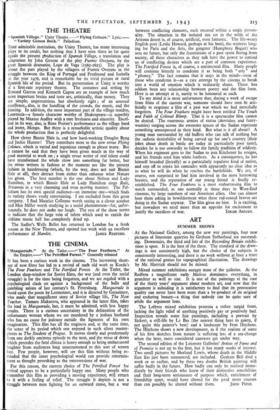THE CINEMA .
IT has been a curious week in the cinema. The increasing short- age of new films has led to a revival of such old work as Korda's The Four Feathers and The Petrified Forest. At the Tatler, the London shop-window for Soviet films, the war (and even the social struggle) is for the time being forgotten, and we are regaled with a psychological clash set against a background of the balls and gambling salons of last century's St. Petersburg. Masquerade is based upon the poem by Lermontov, and it is directed by Gerasimov, who made that magnificent story of Soviet village life, The New Teacher. Tamara Makarova, who appeared in the latter film, takes the lead in Masquerade, but, it must be admitted, with less happy results. There is a curious uncertainty in the delineation of the unfortunate woman whom we see murdered by a jealous husband who has no cause for jealousy outside the figments of his own imagination. This film has all the staginess and, at the same time, the sense of its period which one enjoyed in such silent master- pieces as The Student of Prague. It moves slowly and ponderously from one darkly ominous episode to the next, and .the sense of doom which precedes the fatal climax is heavy enough to bring embarrassed laughter from audiences long unaccustomed to this sort of screen fare. Few people, however, will see this film without being re- minded that the inner psychological world can provide entertain- ment as thought provoking as the extroversions of war.
For this reason, the current choice of The Petrified Forest for revival appears to be a particularly happy one. Many people who rmiember this film as providing a moving experience, will return to it with a feeling of relief. The struggle it depicts is not a struggle between men fighting for an outward cause, but a war between conflicting elements, each encased within a single person- ality. The situation in the isolated inn set in the wilds of the Arizona desert is, of course, artificial, even fantastic. The life-weary English poet (Leslie Howard, perhaps at his best), the waitress long- ing for Paris and the Arts, the gangster (Humphrey Bogart) who sees no future, but only the frustrations of a past spent fleeing from society, all these characters as they talk have the power to remind us of conflicting desires which are a part of common experience. The Petrified Forest is, of course, a sentimental film. Many people will continue bitterly to condemn it as being both " arty " and " phoney." The fact remains that it stays in the minds—even of those who condemn it—as a rare attempt by the cinema to break into a world of emotion which it ordinarily shuns. There has seldom been any relationship between poetry and the film form. Here is an attempt at it, surely to be honoured as such.
To my mind it is most unfortunate that, during a week of escape from films of the current war, someone should have seen fit arti- ficially to respirate a film of a past war which we had mercifully forgotten. The Four Feathers might have been retitled The Youth and Faith of Colonel Blimp. That it is a spectacular film cannot be denied. The enormous armies of extras (dervishes and fuzzy- wuzzies) surging across the awesome spaces of the Sudan represent something unsurpassed in their kind. But what is it all about? A young man surrounded by old buffers who can talk of nothing but the sadistic desirability of being carved up for one's country (their jokes about death in battle are today in particularly poor taste), decides he is too cowardly to follow the family tradition of soldiery. When his regiment goes to the Sudan to join Kitchener he resigns, and his friends send him white feathers. As a consequence, he has himself branded (literally) as a particularly repulsive kind of native, and sets off to rejoin his comrades with apparently no clear idea as to what he will do when he reaches the battlefields. We are, of course, not surprised to find him involved in the most harrowing heroics, and the reputation of our young friend is finally re- established. The Four Feathers is a most embarrassing film to watch surrounded, as one normally is these days in West-End cinemas, by large numbers of our American allies. One can almost hear them asking in bewilderment what these red-coated bravos are doing in the Sudan anyway. The film gives no hint. It is exciting, but nowadays we need more than an appetite for excitement to


























 Previous page
Previous page